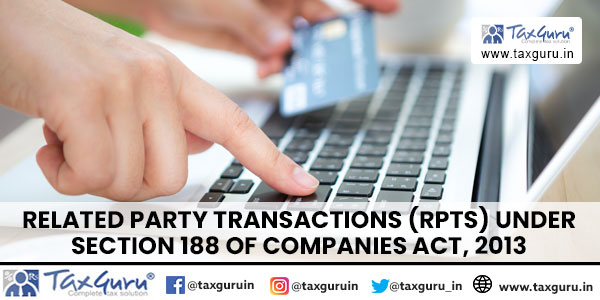Introduction: Section 188 of the Companies Act, 2013, governs the regulation of Related Party Transactions (RPTs). It mandates board approval for any contract or arrangement entered into with a related party, covering a wide range of transactions. However, certain exemptions apply, especially for private limited companies and transactions within wholly owned subsidiaries. Understanding these regulations, including when shareholder approval is required and the conditions under which these rules apply, is crucial for maintaining compliance and ensuring transparent corporate governance.
Applicability of Related Party Transactions (RPT) are prescribed hereunder at glance: –
Any contract or arrangement entered with related party with respect to transactions covered under section 188 of Companies Act, 2013 – Require Board Approval
[Following are the list of transaction covered under section 188 of Companies Act, 2013]
(a) sale, purchase or supply of any goods or materials;
(b) selling or otherwise disposing of, or buying, property of any kind;
(c) leasing of property of any kind;
(d) availing or rendering of any services;
(e) appointment of any agent for purchase or sale of goods, materials, services or property;
(f) such related party’s appointment to any office or place of profit in the company, its subsidiary company or associate company; and
(g) underwriting the subscription of any securities or derivatives thereof, of the company.
Note: In case any transactions entered into by Private Limited Company with its holding, subsidiary, associate or investing Company then Section 188 shall not apply. (As per MCA Exemption Notification dated 5th June 2015)
In case above transactions with Related Party exceeds prescribed threshold limits — Require Prior Shareholder’s Approval
Note: No shareholders’ approval required in case transactions are between a Holding Company and its Wholly Owned Subsidiary. (As per Companies Amendment Act, 2015, effective dated 29th May 2015)

- No member shall vote, to approve any contract or arrangement, if such member is a related Party.
Note: Shall not apply in case 90% or more members are related with promoters or related parties. (As per Companies Amendment Act, 2017, effective dated 9th February 2018)
- Section 188 shall not apply in case transactions entered with Related Party are in Ordinary course of business and at an arm’s length basis.
- In case transactions entered with its Holding Company are not at an arm’s length basis or not in ordinary course of business and exceeds prescribed threshold limits — No prior shareholder’s approval required by wholly owned subsidiary.
Note: Applicable only in case Holding Company took prior shareholder’s approval for entering the said transactions. [As per Companies (Meeting of Board and its Power) Rules, 2014].
Conclusion: Navigating the requirements of Section 188 for Related Party Transactions is essential for compliance under the Companies Act, 2013. Ensuring proper approvals and understanding the exemptions can help companies manage their RPTs effectively. By adhering to these guidelines, companies can maintain transparency and uphold good governance practices, thereby avoiding potential legal and regulatory pitfalls.





